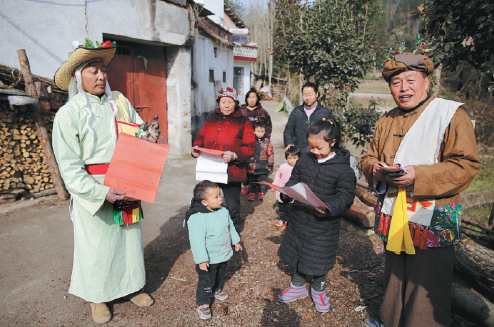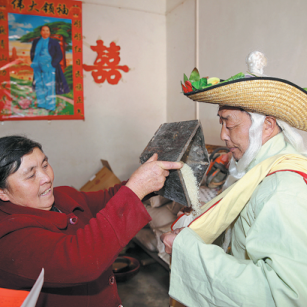Tuning into tradition
Singing Spring Festival greetings has its ancient roots in giving farmers advice on when to sow, Xin Wen reports in Xi'an.


With a song in his heart and singing a melodious tune from the mountainous area, Zhou Tinghuai stands at the door of a villager in Nanzheng district of Hanzhong city in Shaanxi province. With a bag slung over his shoulder, he carries a carved figurine of a farmer riding a bull.
At the door he sings: "When I enter the door, the joy arrives, like a god proffering a gift, that a precious horse laden with gold. This is a prosperous region, and a gifted money tree as a godsend arrives."
The lyrics represent joy and harmony, so no matter who listens, they will feel blessed, he believes.
Zhou, 62, has been engaged in singing for spring blessings for more than 40 years. Since the mid-1970s, he began visiting villagers in the Qinling-Bashan Mountains. He hopes his performance will help give them a feeling of the joy of the season.
Zhou is one of the 48 chunguan, or folk artisans who give the blessings of spring to villagers in rural areas of southern Shaanxi. Every year from the 10th lunar month to the end of the first lunar month of the new year, he crosses mountains to sing and also give them tips on farming.
The custom actually began with an emperor realizing the best way to give farming advice to rural people would be to sing to them.
He will present a spring poster printed using woodblocks as a gift, on which are displayed the four seasons and 24 solar terms, as well as advice about when to sow.
The scene, part of the tradition called "chunguan singing spring", has been preserved for thousands of years. It is also a kind of ancient storytelling folk art.
In 2007, the folk art of chunguan singing spring was among the first batch of intangible cultural heritage activities to be listed in Shaanxi by the provincial government.
In winter and spring every year, Zhou and Mao Yongcheng, 57, an apprentice of Zhou, who's also a native of Nanzheng, visit villagers' homes together, and they each usually give a solo performance. Sometimes when entering streets or densely populated villages, they will sing in unison.
After the performance, Zhou will give a spring-themed poster to people of the household, who in turn give grains (rice and soybeans) or some money to them.





































